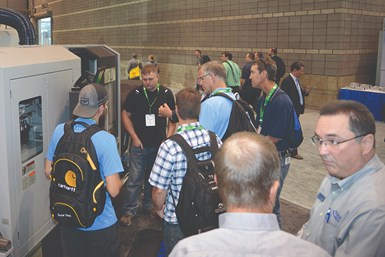Take Your “Economist,” Not Your Engineer, to IMTS This Year
Heresy! Of course, you should take your engineers. And your leads, and your setup and operators. Why the heck should you take your economist? Does your shop even have one?

Attendees learning from exhibitors and other attendees at IMTS. Photo Credit: PMPA
I love IMTS. It is truly the grandest show for the entire metalworking industry. It helps me beat last year’s full-year average steps on my fitness tracker — in just a few days. What isn’t to like about, as Jethro Tull sang so many years ago, “expense account gruel” in Chicago? Why wouldn’t we want to “effectively associate” with so many of our industry friends, colleagues, suppliers, customers and experts in one place? Why wouldn’t we want to compare technologies — and see the best — as fuel for the next two years of dreaming, planning and purchasing to upgrade our shop’s capabilities and ability to serve our customers?
So, why then am I suggesting that this IMTS be viewed through an economic rather than an engineering lens? It’s the economy…jobs, recession, interest rates, supply shocks, energy prices and unknown unknowns.
I know, you are wondering “Why didn’t you start with the recession? Why are you leading off with jobs? We have full employment already, right?”
Right. And that is the point. We are virtually at the same record level of employment that we had prior to COVID-19. According to FRED, All Employees, Total nonfarm (PAYEMS) in February 2020, U.S. employment was 152.54 million. They report 2022 is 151.682 million for May of 2022 — a difference of 858,000.
So, with the labor force fully engaged, it may be unwise to buy new equipment, thinking/hoping that the workforce will come.
What your “economist” will counsel you is to look at your proposed purchases as a way to reduce the need for workforce, by eliminating low-value tasks and automating routines and production. Automatic bar loaders come to mind as just one example of this concept.
Recession
Do not get your “economist” started on this. They could go down the path of “technically, it is not a recession yet since a recession is negative GDP for two consecutive quarters.” Look at your order book — not your balance sheet. Orders are slowing. (Dollar volumes are not — we’ll talk about inflation in a minute.) If we are truly in a recession, we already have one quarter of negative growth behind us, then our best strategy is to keep our cash reserves as cash reserves. U.S. retail sales, business-to-business spending and industrial PMI’s reported by various federal reserve banks are all in a slowing growth mode. Could you be a contrarian and invest in growth as the rest of the economy seems to be slowing? Sure. But why would you?
Recession — whether looming or present but unrecognized — suggests that the best investments you could make would be in technology and tools that could reduce your costs and lower your time to turn around orders. Despite the “recession” customers are still awarding contracts based on lowest costs and best delivery. Buying new technology might not provide you much return in a slowing market — while investments that reduce your costs or reduce your time to produce will increase your competitiveness by lower prices or increasing your capacity and reducing lead times.
Interest Rates
The cost of capital is a critical input to any investment decision. Our closely held family businesses are in a stronger position than many public companies because we can also have what I call “patient capital” — investments that span generations. No need to rush out when interest rates are high and the economy is slowing, except for the right investment. But, unless you have a contract in hand and faith in the counterparty, your economist would likely tell you that at this IMTS, you want to be tactical and not strategic.
“Bold play” is the best way to improve your odds when gambling, according to my statistics professors. Precision machinists are not gamblers. Your economist will bless your decision to invest in a major new technology purchase — not on speculation — but on demonstrated return on invested capital. Do the math. Don’t be hypnotized by the gee whiz factor. If you need new tech to keep the customer, to grow the customer, to sign the new customer — by all means acquire it. After you have done your due diligence on the customer, as well as on the capabilities to produce to specs as stated, that will deliver the business plan and Return On Invested Capital (ROIC). Otherwise, it is a gamble.
Supply Shocks
IMTS is probably your best place to get what you need to protect your shop and your customers from supply shocks. Having a single point of failure in your supply chain is not good business. Neither is having that single point of failure 12 time zones and some indeterminate amount of freight time by ocean vessel away. IMTS is a vibrant venue for you to find alternatives, equivalents and new suppliers for the things that you just cannot seem to find while at your shop and scouring the internet. And share your concerns with the attendees and exhibitors at IMTS — what you are looking for/what you cannot seem to find. Your “economist” probably will not be much help finding a stocking supplier of that particular unobtainable material in Swiss quality. But the person right beside you at IMTS might.
Supply Shocks Part 2
The reason that lead times are so elevated — despite the apparent economic slowdown — is because no one’s manufacturing plans survive the unscheduled delays and shortages across the supply chains. Lack of complementary parts means that, when they are finally provided, the other parts that are required escalate from “urgent”to “critical.” This may mean that duplicating some of your existing capability (that your workforce is familiar with) will increase your production and volume invoiced going forward. Ask your “economist.”
Energy Prices
Energy prices have an outsized impact on our shops because we need to pay the higher (and still escalating) prices to transform materials into parts. But also because as they grow to become a larger share of the consumer’s budget which leaves less money for consumers to spend. Your economist will tell you that the consumer spend is the backbone of the U.S. economy. Anything at IMTS that can save you energy is probably worth the investment, especially because we think inflation will be increasing costs in the future. Each penny saved on energy today may become a nickel or dime saved in a year or two, given that the “economists” at the Fed believe that we are going to have inflation for a lot longer than their official statements.
Unknown Unknowns
Well, who saw COVID-19 coming? How about the Russian invasion of Ukraine? Who would have predicted that the U.S. government would throw tariffs for national security on steel and aluminum which are needed for national security — while letting in articles made from steel and aluminum by non-allies come in tariff-free? Who would have thought that a change in administrations would maintain those tariffs, further reducing the competitiveness of U.S. manufacturers in the global markets? Who was predicting the shortage of space for full and empty containers at our West Coast ports? The shortage of chassis to handle containers. The shortage of truck drivers?
What Is Next?
Who knows. Your economist can tell you to be cautious, and to help you make a rational business decision about what to buy or not at IMTS. But that economist will also tell you that going to IMTS may just be what it takes for you to get ahead of the next unknown. Fellow attendees, vendor presentations and media attention can provide information that does not make the news in the smaller cities. IMTS brings the entire world together in one place to focus on metalworking manufacturing technology and tools. Soak up all it has to teach you. Listen to your economist. Your biggest takeaway may not cost you anything. Listen. Engage. Bring your curiosity. And effectively associate. We will be there. And, if you do not bring your ‘economist,’ I’ll be playing one part-time at our PMPA kiosk in the Gardner Business Media booth.
Read More Articles from PMPA:
- Useful Emotionally Intelligent Phrases
- Craftsman Cribsheet No. 109: PMPA Speaking of Precision Podcasts — Engineering and Material Resources
About the Author
Miles Free III
Miles Free III is the PMPA Director of Industry Affairs with over 40 years of experience in the areas of manufacturing, quality, and steelmaking. He helps answer “How?, “With what?” and “Really?” Miles’ blog is at pmpaspeakingofprecision.com; email – mfree@pmpa.org; website – pmpa.org
Related Content
Craftsman Cribsheet No. 119: Defeating the Hanging Cross-Hole Burr
Deburring is a tedious task that is better left to machines.
Read MoreCraftsman Cribsheet No. 128: Why Do Machinists Say Tenths Instead of Ten Thousandths?
In machinist parlance, a tenth is a tenth of a thousandth, not a tenth of an inch.
Read MoreKeeping It In The Family — Succession Tips From Those Who Lived It | Part 1
PMPA members share some tips to avoid getting burned when passing the business torch from one family member to another.
Read MoreCraftsman Cribsheet No. 126: AISI System of Identification
Source: PMPA Prior to the Society of Automotive Engineers taking responsibility for Steel Grade nomenclature in the United States (1995), the American Iron and Steel Institute determined U.S. standard steel grades in collaboration with SAE.
Read MoreRead Next
Do You Have Single Points of Failure?
Plans need to be in place before a catastrophic event occurs.
Read More5 Aspects of PMTS I Appreciate
The three-day edition of the 2025 Precision Machining Technology Show kicks off at the start of April. I’ll be there, and here are some reasons why.
Read MoreA Tooling Workshop Worth a Visit
Marubeni Citizen-Cincom’s tooling and accessory workshop offers a chance to learn more about ancillary devices that can boost machining efficiency and capability.
Read More






















